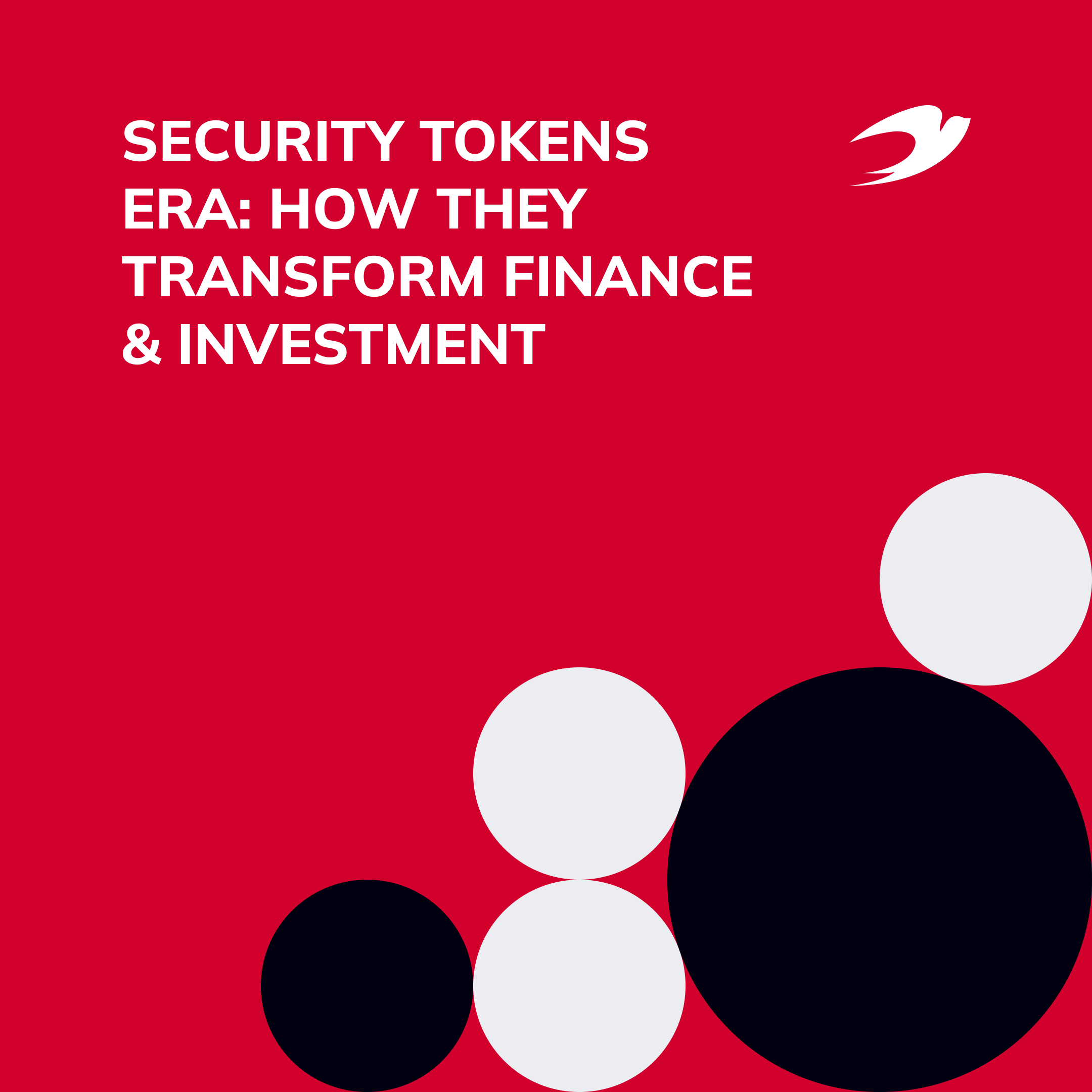At present, there’s a big fuss made around security token offerings (STO) in the crypto asset community. From an operational and a regulatory perspective, these tokens surely have a huge potential to reshape and optimize the current fundraising mechanisms.
But does it mean the security token era is the future of the finance and investment industry?
According to the recent market study by Deloitte, the answer is YES. Security tokens are expected to become the securities of tomorrow, as they can provide clear benefits in terms of transparency, efficiency and enhanced liquidity. Moreover, successful projects, such as Securitize, already getting the leading positions in the world of security assets.
In this article, we’ll make a comprehensive overview of security tokens in crypto, covering their benefits and key market insights in the STO niche. Additionally, IdeaSoft’s specialists will underline the major development aspects in building a robust digital securities ecosystem based on our recent project – issuance platform development for the Securitize project.
Looking for an experienced dev team?
Whether you’re interested in launching a custom solution for asset tokenization or need expert support for the existing product, our developers will get you covered. Contact our professional development team and find out how you make the most of your security token project today!
Table of content:
- Security Tokens Market Overview & Its Future Perspectives
- Why Do Security Tokens Matter?
- Limitations & Benefits of Security Tokens
- Our Expertise: Securitize Project
- Summary
Security Tokens Market Overview & Its Future Perspectives
The real-case successful examples of security tokens, such as Polymath, Harbor, tZero and Securitize have uncovered the immense potential of this niche across many industries. The recent overview by Meticulous Research forecasts the tokenization market value to grow from $3.76 billion in 2023 to $13.23 billion by 2030. Such an impressive market projection encourages businesses to consider the ways on to invest in security tokens and the business benefits of these projects.
In the finance and investment niche, the significant market growth of security tokens is explained through the increasing awareness, wide adoption of this technology and its ability to reshape traditional investment mechanisms. According to Andrii Lazorenko, the CEO and co-founder of the IdeaSoft blockchain development company, the future of security tokens can be interpreted directly from their technical specifications.
“The unique feature of security tokens is their ability to “tokenize” the value of nearly any real-world asset, which can be easily managed and transferred through blockchain. So, once the regulatory requirements are put in place, their presence on the blockchain will become legal, significantly increasing the market capitalization.”
Andrii Lazorenko, CEO and co-founder of IdeaSoft
An intensive market expansion over the next few years is not the only factor that identifies the success of security token projects. The legalized digital tokens are expected to facilitate swift and streamlined financing processes while keeping them fully secure and cost-efficient. For instance, individuals will have the ability to undergo a prompt Know Your Customer (KYC) verification, whitelist their digital wallets, and execute transactions efficiently. In fact, this becomes critical for small and medium-scale projects that need to quickly acquire the capital they need for the successful product development and release.
Why Do Security Tokens Matter?
In our recent blog post, the IdeaSoft specialists already discussed the key differences between digital security tokens and utility tokens and their role in blockchain projects. Here, we’ll analyze the key aspects of why security tokens are important and their potential in the finance and investment landscape.
Security tokens and blockchain can bring numerous benefits to large corporations and prospective startups. Once integrated, these technologies can automate and optimize the asset management and exchange processes, making them fast, simple and more accessible compared to the traditional mechanisms.
Along with seamless and efficient trading, adopting a crypto security token will enable easier access to the global markets, helping companies improve their development and growth.
Unlike other digital solutions, crypto security tokens also offer a decent transparency level to its users and ensure high-level security based on a strict regulatory background. In particular, such tokens need to comply with the Know Your Customer (KYC) and Anti-Money Laundering (AML) laws, as well as the numerous regulations of other relevant jurisdictions.
Finally, security tokens are the game-changers in the financial industry, as they can unlock huge liquidity pools for traditional systems. This benefits all the network participants: the issuing company and the owners of security tokens.
Got lost in tech details?
Let us help you figure it out, and correctly draw up the requirements for your project
Limitations & Benefits of Security Tokens
The actual value of any technology highly depends on the advantages and potential limitations it can provide for your business. Below, our experts have made a comprehensive summary of the key pros and cons of digital security tokens, explaining their efficiency from the business development standpoint.
What Are the Benefits of Security Tokens?
Compared to traditional forms of securities, security tokens can uncover numerous advantages for a company or business. Below, IdeaSoft experts have uncovered the core aspects of how companies and enterprises can benefit from security token solutions.
The Key Advantages of Security Tokens
| Global Accessibility | Blockchain technology allows for the direct trading of security tokens, in which no intermediaries are required. This potentially opens up numerous investment opportunities to broader and more diverse audiences. |
| Enhanced Efficiency & Automation | Smart contracts enable automated compliance with regulatory requirements, which helps to reduce administrative overhead and streamline the issuance and transfer process. |
| Cost-Effectiveness | The automation and optimization benefits provided by security tokens and blockchain can also result in greater cost efficiency. In particular, this becomes possible due to lower issuance costs and reduced fees associated with trading and settlement. |
| Improved Compliance & Security | Built-in compliance features of security token can ensure that only eligible investors can participate in offerings, helping issuers adhere to regulatory requirements. Additionally, the security features of blockchain technology can protect against fraud and unauthorized changes to ownership records. |
| Accessibility for Small and Medium-sized Enterprises (SMEs) | With crypto security tokens, SMEs can raise capital in a more streamlined and cost-effective manner compared to traditional fundraising methods. This can lead not only to optimized cost expenses but also to drive larger investments for development and growth. |
| Fractional Ownership | Unlike other digital tokens, security tokens provide fractional ownership solutions for high-value assets (for instance, equity, dividend, profit shares, voting, or buyback rights). This also allows to engage a larger number of investors, including those that were previously out of reach. |
| Increased Liquidity | Digital security tokens can potentially improve liquidity in traditionally illiquid markets across various industries (for ex. real estate). This is mainly achieved through the optimizations of the exchange process, which becomes more flexible, accessible and much faster compared to the traditional options. |
Security tokens open up a wide range of improvements from both business and client perspectives. From enhanced efficiency, transparency and process automation to improved liquidity and global market access – you’ll get the first results right after its integration.
Potential Limitations of Digital Security Tokens
Along with the security token advantages, it’s also important to keep its limitations and architecture specifications in mind. Below, IdeaSoft developers have covered the major characteristics of security tokens that should be considered before the project development.
- High Entry Barrier. Only accredited investors can whitelist a wallet and purchase security tokens, which potentially narrows the audience number. To pass the accreditation, investors need to comply with the regulatory authorities and the laws of the respective countries.
- Small Secondary Market: This problem stems from the first issue. Since there are relatively few accredited investors worldwide, even if you manage to buy a security token, selling it can be quite challenging. Holding onto it for a long time may be necessary because of limited market liquidity.
- Financial Literacy. To successfully pass accreditation and start engaging with security tokens in crypto, an individual must possess a high level of education, significant experience in financial instruments, and capital.
- Market Competition. Typically, accredited investors start with well-established and trending assets like Tesla stocks and others. The token investments on niche-specific assets like for example security tokens of Ethereum, can be lower due to the lack of its awareness and asset volatility.
Knowledge and awareness of token specifications is one of the key points that can identify the project’s success. At IdeaSoft, our developers have deep expertise in tokenized technologies and proven experience in building security token exchanges. Our team creates a business-driven product that fully covers the specifications and benefits of security tokens.
Our Expertise: Securitize Project
One of the recent blockchain-based development projects delivered by IdeaSoft is the tokenized securities platform for Securitize. This tech-driven solution enables a seamless, compliant cross-chain trading of private securities on public platforms and multiple blockchains.
Its integrated solutions, such as Digital Securities Protocol (DS Protocol), functional investor dashboard and multi-blockchain support, enable seamless and fully secure cross-border transactions, outstanding efficiency and excellent user experiences.
How to Issue a Security Token with Securitize?
Our team has created a straightforward algorithm for digital security issuance, management and exchanges, which consists of the following stages:
- Step 1: Secure Custody of Cryptocurrency. Acquire the desired amount of cryptocurrency, such as Ethereum (Ether), and secure these digital assets by putting them into a secure custody solution.
- Step 2: Audit and Proof-of-Reserves. Engage a service like Chainlink to ensure transparency and provide proof-of-reserves for the cryptocurrency held in custody.
- Step 3: Tokenization. Tokenize your cryptocurrency through the Securitize platform (or its alternative), so that one token can now represent the value of the equivalent amount of Ether securely held in custody.
- Step 4: Security Token Offering (STO). Offer the newly created security tokens to potential investors. In such a case, a security token performs as a tradable financial instrument, similar to a bond with specific conditions. Additionally, it represents ownership of the underlying cryptocurrency held in custody.
- Step 5: Regulatory Compliance. Ensure that the security token offering complies with relevant securities regulations and requirements.
- Step 6: Investment. Investors can purchase the security tokens, effectively gaining exposure to the cryptocurrency (e.g., Ether) held in custody.
- Step 7: Asset Management. Manage and monitor the cryptocurrency holdings in custody to maintain transparency and security.
Today, the issuance platform Securitize is known as the first and only platform to fully integrate compliance protocol with regulated marketplace ATS and to enable live trading security tokens. The IdeaSoft developers helped to build an efficient, secure and highly profitable solution that has already revolutionized the security token market.
Summary
Security tokens open up a wide range of opportunities for business development and growth. Their high liquidity potential, and accessibility and effectiveness enable access to the benefits that are unavailable for utility tokens, or fiat currencies.
Now it becomes obvious that crypto security tokens are the future of finance and investment. Over the next years, more companies are expected to invest and develop their asset tokenization solutions to increase their operational efficiency and business competitiveness.




